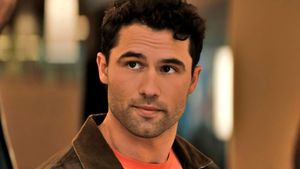Attorney general
nominee Michael Mukasey refused to say Thursday whether
he considers waterboarding a form of torture, frustrating
Democrats and potentially slowing his confirmation to
head the Justice Department.
In an
increasingly testy second day of hearings before the Senate
Judiciary Committee, Mukasey also said he is reluctant to
support legislation protecting reporters from being
forced by courts to reveal their sources. The
Democratic-led panel has approved those protections,
which President Bush has threatened to veto.
Mukasey, a
retired federal judge who has ruled in some of the nation's
highest-profile terror trials, repeatedly avoided discussing
the legality of specific interrogation techniques --
including forced nudity, mock executions and simulated
drowning known as waterboarding.
To comment would
be irresponsible ''when there are people who are using
coercive techniques and who are being authorized to use
coercive techniques,'' Mukasey said.
''And for me to
say something that is going to put their careers or
freedom at risk simply because I want to be congenial -- I
don't think it would be responsible of me to do
that,'' Mukasey said.
Instead, Mukasey
stuck to his earlier definition of torture as illegal
and unconstitutional -- irritating Democrats who demanded a
clearer answer.
''I'm hoping that
you can at least look at this one technique and say
that clearly constitutes torture, it should not be the
policy of the United States to engage in
waterboarding,'' said Sen. Dick Durbin, an Illinois
Democrat.
''It is not
constitutional for the United States to engage in torture in
any form, be it waterboarding or anything else,'' Mukasey
answered.
During terse
questioning by Democratic senator Sheldon Whitehouse of
Rhode Island, Mukasey said he did not know if waterboarding
is torture because he is not familiar with how it is
done.
''If it's
torture?'' Whitehouse responded incredulously. ''That's a
massive hedge. I mean, it either is or it isn't.''
''If it amounts
to torture, it is not constitutional,'' Mukasey answered.
''I'm very
disappointed in that answer,'' Whitehouse said. ''I think it
is purely semantic.''
Mukasey looked
down at his hands and took a deep breath.
Congress has
prohibited cruel, inhuman, and degrading treatment of terror
suspects, that lawmakers have said includes waterboarding.
The Bush administration has refused to say whether
waterboarding is among the interrogation techniques
prohibited in an executive order last summer.
Senate Judiciary
Chairman Patrick Leahy, a Vermont Democrat, indicated
he'll wait to get clearer answers from Mukasey before
scheduling a committee vote to confirm him.
''I would think
he would want to answer as quickly as he can,'' Leahy
said.
Even so, Senate
aides said they expect a vote on Mukasey by the end of
the month at the latest.
White House
spokesman Tony Fratto said Mukasey ''is not in a position to
discuss interrogation techniques'' that are classified, such
as waterboarding. Mukasey ''did not rule in or out any
specific interrogation techniques,'' Fratto said.
Mukasey's
testimony was followed by a panel of judges, lawyers and
other legal experts who mostly praised him, but
several took issue with his stand on waterboarding.
''Other than
perhaps the rack and thumbscrews, waterboarding is the most
iconic example of torture in history,'' said retired Rear
Adm. John D. Hutson, a former Navy lawyer and dean of
Franklin Pierce Law Center in Concord, N.H. ''It has
been repudiated for centuries. It's a little bit
disconcerting to hear now that we're not quite sure where
waterboarding fits in the scheme of things.''
Mukasey also
irked senators who sought to pin him down on how much legal
leeway he would give the president, as authorized in the
Constitution, beyond laws that have been approved by
Congress.
The struggle over
the balance of power has been a hot topic during
Mukasey's hearings, underscoring two issues confronting the
Justice Department -- the extent of presidential
authority to eavesdrop on terror suspects, and
congressional subpoenas to force administration aides to
testify about whether politics influenced the firings of
nine U.S. attorneys last year.
Regarding the
subpoenas, ''we are at an impasse,'' said Sen. Arlen
Specter of Pennsylvania, the panel's top Republican.
''We have tried
to find a way of accommodating what the president wants
to do,'' Specter said. He asked Mukasey ''to take a close
look at it; see if you can help us resolve this
impasse.''
Specter also
asked Mukasey to explain, in writing, specific objections to
the proposed media shield law that would protect reporters
from revealing confidential sources. Mukasey told
senators the law would hinder prosecutors and could
protect bloggers who are also spies or terrorists.
''The system
worked passably well up until now,'' Mukasey said.
Congress says a
media shield is necessary to protect reporters and
government whistleblowers who reveal improper or illegal
official activity. Fifty news outlets, including the
Associated Press, support the legislation.
Senators welcomed
many of Mukasey's answers during three hours of
testimony. He told Democratic senator Russ Feingold
of Wisconsin that he would let posters be put up
for events for gay and lesbian Justice Department
employees. Posters have been banned in the past.
Mukasey also told
Sen. Tom Coburn, an Oklahoma Republican, that he would
keep a sharp eye on the millions of dollars spent each year
for employees to attend conferences.
The hearing,
though testy at times, left little doubt that Mukasey would
be easily confirmed.
''The real test
is going to be what kind of attorney general you'll be,''
Leahy told Mukasey.
Mukasey
responded, ''The only thing I can tell you is if you
ultimately do repose trust in me, I'm going to spend
the next how many months it is trying to vindicate
that trust.'' (Lara Jakes Jordan, AP)




































































Charlie Kirk DID say stoning gay people was the 'perfect law' — and these other heinous quotes